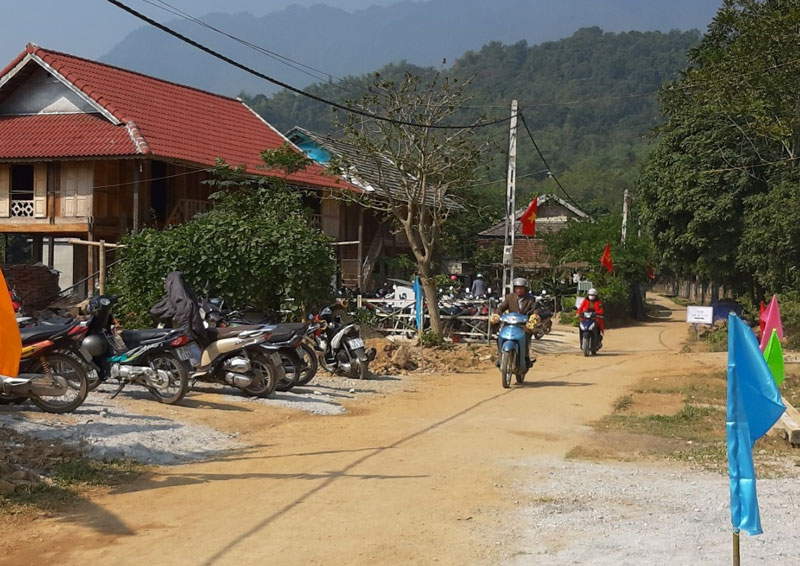
(HBO) – Na Phon commune in Mai Chau district achieved only three out of the 19 new-style rural building criteria when it started the programme in 2011. At that time, the commune’s poverty rate was 25.5 percent and the per capita per capita, just 10 million VND per year.
As locals play a significant part in the
implementation of the programme, the commune has earned the new-style rural
status by the end of 2019, with per capita income increasing to 32.5 million VND and the poverty rate brought to 4.6 percent.
 Rural roads in Na Phon commune, Mai Chau
district, are upgraded to reach new-style rural standards
and meet local travel demand.
Rural roads in Na Phon commune, Mai Chau
district, are upgraded to reach new-style rural standards
and meet local travel demand.
The commune
has mobilised a total of nearly 71.84 billion VND in funding for the new-style
rural programme, 18.63 billion VND of which was sourced from people. The fund
has been invested in building roads and developing infrastructure and production.
With the motto
"the State and people do it together”, the commune has allocated over 24 billion VND for road projects. Thanks to
that, its network of inter-commune and inter-village roads has been concreted to facilitate travel and
economic production.
Keeping in
mind that economic development and income improvement are the two key tasks,
the commune has taken advantage of new-style rural funding, the World Bank’s
financial assistance and State budget to expand production. It has applied
advanced technology, shifted
to farming of more sustainable crops and animals, and studied the market. Thanks to such efforts, local income has improved.
In addition,
the commune has continued accelerating support for scaling up effective
business models, for example safe vegetable production and husbandry, and
community-based tourism.
To keep up the
good work, the commune plans to boost investment in rural infrastructure and
production. It will develop agriculture in tandem with tourism, services and
trade; preserve cultural identity; build green and clean environment; and
strengthen the political system
at the grassroot level./.
Hoa Binh province is undergoing a dynamic transformation amid Vietnam’s national digital transition. Building on Poliburo’s Resolution No. 57-NQ/TW on breakthroughs in science, technology, innovation, and national digital transformation, the province has rolled out a wide range of practical action plans. A standout initiative is the "Digital Literacy for All” movement, an effort to ensure that no one is left behind in the digital era.
Hoa Binh province is undergoing a dynamic transformation in the wake of the national digital transformation movement. Building on Resolution No. 57-NQ/TW of the Politburo on breakthroughs in science, technology, innovation, and national digital transformation, the province has implemented a wide range of practical action plans. A standout initiative is the "Digital Literacy for All” movement ambitious effort to ensure that no one is left behind in the digital age.
With a spirit of unity and proactive problem-solving, the Party Committee, the government and the people of Dong Lai Commune (Tan Lac District) have made great strides in implementing the resolutions of the 24th Party Congress of the commune for the 2020 - 2025 term. Focusing on leadership and practical actions, the commune has brought the Party’s resolutions into daily life, creating strong impacts and pushing the local development forward.
Amid the nationwide push for digital transformation, young people in Hoa Binh Province are stepping up as dynamic pioneers, applying technology to enhance Youth Union operations and expand the reach of youth-led initiatives. Through creativity and adaptability, Youth Union organizations at all levels have introduced a series of practical solutions, contributing to modern governance and community development.
In recent years, An Nghia commune, located in Lac Son district, has stepped up administrative reform, focusing on improving the quality and efficiency of its single-window service unit for receiving and processing administrative procedures. These improvements have helped create favourable conditions for local residents and organisations to handle administrative procedures, contributing to the commune’s broader socio-economic development.
The Prime Minister-approved master plan to develop the multi-use value of forests ecosystems through 2030, with a vision to 2050, aims to improve the management and sustainable use of forest resources, create jobs, increase incomes, and improve the living standards of ethnic minorities, people in mountainous and remote areas, forest workers and those living near forests.



 Rural roads in Na Phon commune, Mai Chau
district, are upgraded to reach new-style rural standards
and meet local travel demand.
Rural roads in Na Phon commune, Mai Chau
district, are upgraded to reach new-style rural standards
and meet local travel demand.